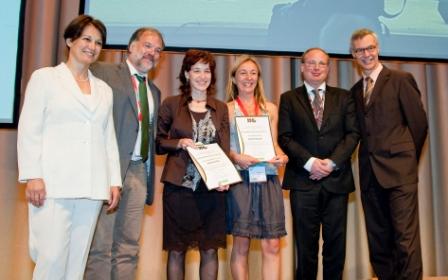The German central research funding society DFG has issued a press release about two decisions on research misconduct. The main point concerns the Bremen University diabetes researcher Kathrin Maedler (see my story here) and strips her of the prestigious Heisenberg professorship awarded to her by DFG in 2014, after having found her guilty of misconduct and co-responsible for misrepresentation of research data in 6 publications. Today’s DFG decision stands in contrast to two previous investigations by the Universities of Bremen and Zürich, which acquitted Maedler of all suspicions of misconduct and upheld the validity of all her published research results. This is my Google-translate assisted English translation of the Mädler section of DFG press release.
Scientific misconduct: Decision in two DFG procedures
The General Committee decides to withdraw Heisenberg’s professorship […]
The German Research Foundation (DFG) is once again drawing conclusions from the scientific misconduct by the scientists it funded. In its meeting on 8 December 2016 in Bonn, the main committee of the largest research funding organization and central self-administration organization for science in Germany decided in two cases to implement measures in accordance with the DFG procedural rules for dealing with scientific misconduct. In doing so, it followed the recommendation of the DFG committee to investigate allegations of scientific misconduct.
In the first case, the main committee found a scientific misconduct by the pharmacologist Professor Dr. Kathrin Mädler, who works at the University of Bremen and had received from the DFG an approval for a Heisenberg professorship in 2014. An investigation was initiated against Mädler in March 2015, after a number of her publications had been suspected of scientific misconduct. Since the allegations were also examined by the University of Bremen, the DFG procedure was suspended. In the same way, the appointment procedure at the University of Bremen, which was connected with the approval of the Heisenberg professorship, was suspended by the university. After the Bremen University ended its investigation in September 2016 – and its rector determined repeated negligence and violation of supervisory duties by Mädler – the DFG procedure by the committee for the investigation of allegations of scientific misconduct was resumed.
After intensive examination of the allegations and on the basis of several statements, the examination report of the University of Bremen and Mädler’s hearing, the committee – as before also the University of Bremen – came to the conclusion that six publications, which are based on DFG funding, contained false information. Thus, results were presented in figures which descriptions did not correspond to the illustrated blot. Also figures were used from older publications, which had originated in a different context and had nothing to do with the experiments described now.
The DFG committee makes Mädler responsible for this misinformation, due to her work as head of the research group and her role as correspondent author of the publications. According to the Committee, there are no indications for Mädler’s own attempts at misinformation. On the contrary, the Committee noted that other authors who had belonged to Mädler’s research group had been responsible for the reuse of the illustrations, which Mädler did not deny in her hearing. The Committee, however, came to the conclusion that Mädler had neglected her duty of supervision over these employees in a gross way, which also led to a co-responsibility and a scientific misconduct according to the DFG procedural regulation.
As a suitable and appropriate measure in accordance with the DFG procedural regulations, the Examination Board proposed to the main committee the withdrawal of the Heisenberg Professorship for Mädler, which was approved in 2014. This was seconded by the main committee.
“In view of the mistakes and shortcomings of the supervisory and organizational obligations, Mrs Mädler no longer fulfills the prerequisites for the appointment of a Heisenberg professorship. The Heisenberg professorship is granted as a “career milestone” every year in only a few cases by the DFG and is not just a project, but a promotion of people with high requirements, even and precisely scientific integrity, and with a high role model. These conditions are no longer given with Mrs Mädler, which is why, according to the current state, she would not be granted a Heisenberg professorship”,
said the Secretary General of the DFG and chairman of the Committee on the Investigation of Suspicions of Scientific Misconduct, Dorothee Dzwonnek, after the decision. The Committee, on the other hand, did not consider as appropriate other measures, such as an exclusion of grant funding applications, since, in principle, Mädler should be given the option of obtaining extramural funding.
[…]

Update 16.01.2018. I now found out that in the wake of this DFG investigation, Kathrin Maedler also saw her Ferdinand Bertram Prize revoked. It was awarded to her in 2011 by the German Diabetes Society (DDG), and announced by University of Bremen in a press release, which then other media reported. The DDG press spokesperson Kerstin Ullrich declared to me now:
“The DDG revoked the Ferdinand Bertram Prize awarded to Mrs Maedler due to her retracted publications. Regarding this decision, the DDG was in contact with the investigators working on this case for the German Research Foundation”.
Update 27.10.2020
The DFG now gave Maedler another grant in 2020. Some honest scientists had their applications rejected as not good enough. Only fair!

Donate!
If you are interested to support my work, you can leave here a small tip of $5. Or several of small tips, just increase the amount as you like (2x=€10; 5x=€25). Your generous patronage of my journalism will be most appreciated!
5.00 €


Pingback: Kathrin Maedler: persecuted genius or zombie scientist? – For Better Science
Dear Leonid,
The second part of the press release of DFG only refers in general terms to a second case of research misconduct.
(1): ” (….) identische Abbildungen mit einer bereits früher publizierten Studie aufgefallen.”
(2): ” (….) der Wissenschaftlerin eine Verantwortung für die Falschangaben in dem eingereichten Manuskript aufgrund ihrer Benennung als Corresponding Author zukommt.”
Do you have any background details about this case (for example the name of the reseacher, a ‘Wissenschaftlerin’, so no male, and details about the manuscript in question)?
LikeLike
I have no information about this second case and therefore it is omitted here as not to create confusion with Maedler decision
LikeLike
Hi Leonid
Now that she has lost the money, what comes next?
Does UB close down the lab due to lack of funding?
Or, does she loose that prestigious “Habilitation” and title of professor?
Inquiring minds like to kow.
LikeLike
Well, Maedler’s husband Lutz just won the Leibniz Society Award of €2.5 million. Maybe he has a position in his engineering department now?
LikeLike
Earlier this year, KM decried her anonymous online critics as being “a targeted violent campaign against my person” who “in no case uncover wrong published data”.
Perhaps those anonymous online critics were onto something after all?
LikeLike
One open question remaining: which 6 papers are the ones found unreliable, and how the journals intend to react. From what I reported before, there isn’t much hope.
LikeLike
http://diabetes.diabetesjournals.org/content/57/3/645
This paper surely is one of them. Diabetes already issued an expression of concern AND a correction for this manuscript. It’s been cited over 250 times and has been an important driver of much work in this field for many years. Disaster.
LikeLike
Pingback: The Kathrin Maedler Dynasty – For Better Science
Pingback: Steffen Reinbothe: duplications planted on PNAS contributed track – For Better Science
Pingback: Bremen Rector Bernd Scholz-Reiter, a hero of Open Access? – For Better Science
Pingback: The Ballad of Claudio Hetz – For Better Science